“The Nth Degree”
Written by Joe Menosky
Directed by Rob Legato
Season 4, Episode 19
Production episode 40274-193
Original air date: April 1, 1991
Stardate: 44704.2
Captain’s Log: Crusher and Barclay are performing Cyrano de Bergerac, the former as Roxanne, the latter in the title role. Barclay is pretty terrible, though he has very occasional flashes of talent — but yeah, mostly terrible. In the audience, Riker, Troi, and La Forge are all clapping enthusiastically. Data and Worf are both less enthused, though the former comes around when Riker points out that it’s polite to applaud and pretend like he was good.
The Enterprise arrives at the Argus Array, an automated subspace telescope on the edge of Federation space. It stopped working, and the Enterprise has been sent to fix it. Worf detects an unidentified object near the array, and Picard sends La Forge in a shuttle.
La Forge takes Barclay onto Shuttle 5, and they start scanning the device. They try a bunch of things, but the device is parsimonious with revelations. When they try a positron scan, there’s a burst of light, the shuttle computer is knocked offline, and Barclay is rendered unconscious.
Barclay and La Forge are beamed back to the ship, with Barclay in sickbay. The flash overloaded his optic nerves and rendered him unconscious — La Forge’s VISOR filtered it out.
When Picard decides to take the probe in tow, it starts moving — though its method of propulsion is unclear. It heads right for the Enterprise, and proves invulnerable to phaser fire. The probe’s energy output continues to increase, and Worf expresses concern for the ship’s safety. The probe follows them even at warp.
Then Barclay takes the ship to impulse, using warp power to increase shield output by 300%, which allows them to use photon torpedoes (the probe was too close to risk that before). The thing is, Barclay did all this without checking with La Forge, he just barged ahead.
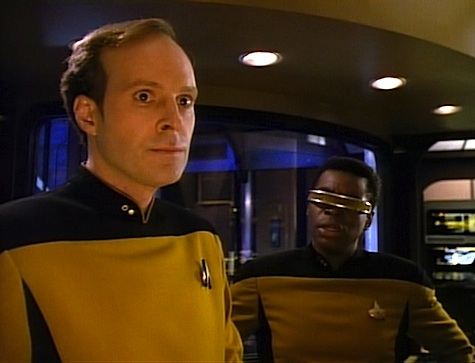
Heading back to the array, La Forge says that the telescope’s computer’s inoperable (probably from the probe), and the reactors were also damaged. They have to repair them one by one. Barclay disagrees (rather publicly, and confidently) and says they can all be repaired at once if they just create a new operating system for the array. Data points out that it would take weeks to do that, but Barclay claims he can do it overnight.
That evening, Barclay does another scene from Cyrano in Crusher’s acting workshop, and it’s night and day from his earlier work, a brilliant performance. Troi follows Barclay to Ten-Forward and says that he’s changed. Barclay agrees — he’s found confidence that he never knew was there.
The next morning, Barclay isn’t at the engineering meeting, and the computer locates him on a holodeck. Fearful that Barclay has regressed, La Forge goes to the holodeck — only to find that Barclay isn’t in one of his fantasies. Exactly. Instead, he’s been up all night with a holographic simulation of Albert Einstein, discussing dimensional theory.
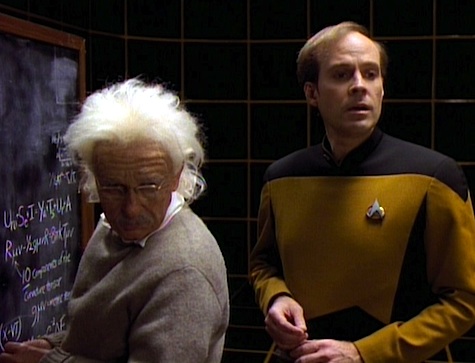
La Forge is worried. This is a massive change in behavior — and intelligence — for Barclay, and they need to know what happened. Reluctantly, Barclay goes to sickbay, where Crusher discovers that his brainwave activity is off the charts. His IQ is in the thousands, and he’s also experienced an increase in creativity, imagination, and more. The senior staff expresses concern over whether or not he’s dangerous, with Riker raising the possibility of confining him to quarters. But he hasn’t actually done anything threatening, and they can honestly use his help fixing the array. Besides, can you really lock somebody up for being too smart?
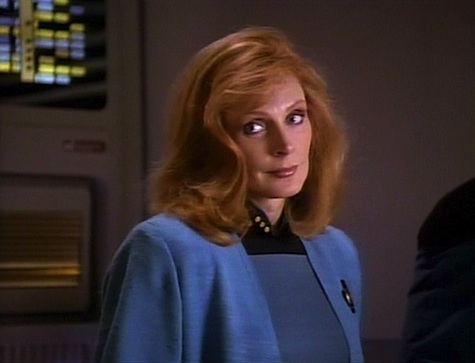
One of the array reactors starts breaking down, and it has a cascade effect. They can’t shut it down from the Enterprise, and the whole thing will explode in about ten minutes. Barclay, frustrated with the slow speed of the computer, goes to the holodeck to build a neural interface between the ship’s computer and his mind. The bridge loses computer control for a moment, and when it comes back, the array’s reactors have shut down.
When Picard asks the computer what happened, Barclay responds. He has interfaced directly with the ship’s computer. Most of his higher cognitive functions are now in the computer core — and he can’t put them back, as his human brain wouldn’t be able to handle it anymore and he’d die.
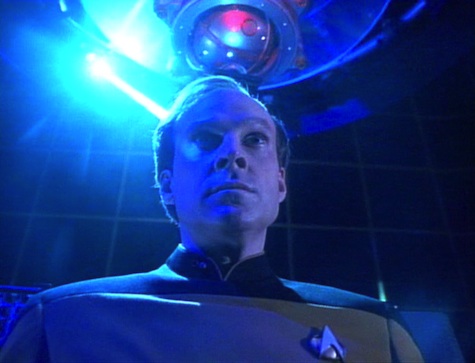
The senior staff meets in the observation lounge — after La Forge cuts the room off from the computer. Data suggests a bypass from engineering to the bridge so they’d still have control of propulsion. As La Forge does the work, he and Barclay talk — the engineer’s understanding is all-encompassing. He now understands everything, and feels he’s been chosen for a great purpose.
As if to prove it, Barclay uses the Enterprise nacelles to form a graviton wave that is creating a subspace field, which Barclay says will allow them to travel farther than any human has ever travelled before. Picard orders him to stop, but Barclay says he’d rather not. This is the first time he’s been insubordinate.
Troi tries to convince him to obey the captain’s orders, but he refuses, and also blocks La Forge’s bypass.
The Enterprise enters the subspace field, and Barclay is now refusing to respond to Picard. Reluctantly, the captain orders Worf to disconnect Barclay — but he’s now protected by a force field. The ship goes into a bizarre distortion, and then comes out of it 30,000 light-years away, near the center of the galaxy.
It turns out that the probe belonged to a species known as the Cytherians. They are on the same mission as the Enterprise: seeking out new life and new civilizations. But their method of doing so is to bring people to them. They tried to impart the information to the Argus Array computer and to the shuttle computer, but the technologies were incompatible — however they were able to “reprogram” Barclay so that he would be able to bring the Enterprise to the Cytherians’ home.
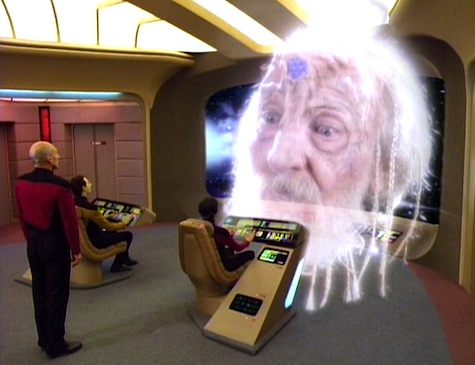
For the next ten days, the crew hangs out with the Cytherians, who then send the Enterprise back to Federation space with nifty new knowledge that it’ll take decades to parse. Barclay, meanwhile, is back to normal — he remembers everything he did, but can’t remember why or how. He feels “smaller,” but there’s at least some residue of what happened, as he suddenly now knows how to play chess…
Can’t We Just Reverse the Polarity?: La Forge and Barclay try a bunch of scans: a passive high-res series on the EM band, a neutron densitometer (which sounds like something out of a 50s alien-invasion movie), an active scan, and a positron emission.
As the episode progresses, Barclay lets loose with several streams of technobabble, ranging from a way to improve Crusher’s scanning equipment to instructing the holodeck on how to construct a neural-scan interface.
Thank You, Counselor Obvious: Troi and Barclay talk about how far he’s come. Barclay isn’t entirely convinced that acting on stage as another person is all that much different from what he did on the holodeck, but Troi points out that he’s interacting with other people when he’s on stage, not hiding away from everyone else.
There is No Honor in Being Pummeled: Crusher points out to Worf — who has been watching the theatrical work with barely concealed disdain — that she has an opening in her acting workshop, prompting the standard Worf “oh no anything but that!” expression.
No Sex, Please, We’re Starfleet: Barclay asks Troi for a walk in the arboretum, which she politely refuses due to the inappropriateness. Later, when Picard asks if Barclay’s done anything that could be considered threatening, Troi hesitantly mentions that he made a pass at her — “a good one.” After the meeting, Riker asks if the pass was successful, and Troi just smiles and leaves, which is delightfully mean. And in the end, after Barclay has returned to normal, Troi takes him up on that walk, which Barclay nervously agrees to.
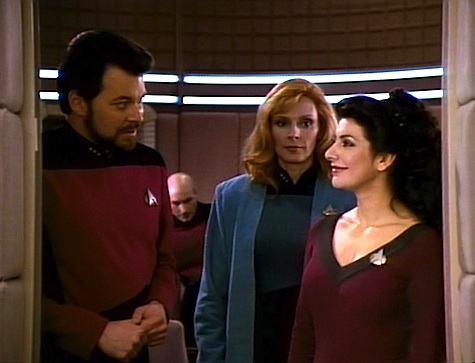
What Happens on the Holodeck Stays on the Holodeck: Barclay uses the holodeck to create a neural interface with the ship’s computer, enabling the ship to respond directly to his thoughts.
In the Driver’s Seat: Ensign Anaya gets to fly the ship this week — at least, when Barclay allows her to.
I Believe I Said That: “It just occurred to me that I could set up a frequency harmonic between the deflector and the shield grid, using the warp-field generator as a power flow anti-attenuator and that, of course, naturally created an amplification of the inherent energy output.”
“Uh huh. I see that.”
Barclay providing technobabble, and Riker refusing to admit that he didn’t follow a single word he said.
Welcome Aboard: Jim Norton makes the first of two appearances as a holographic Albert Einstein (he’ll be back in “Descent,” playing poker with Data, Sir Isaac Newton, and Stephen Hawking). Page Leong plays the latest conn officer, Ensign April Anaya, while Saxon Trainer and David Coburn play a couple of engineers needed to fill out the scenes there. The late Kay E. Kuter does a very Danny Kaye-like turn as the Cytherian’s big giant head (he’ll be back on Deep Space Nine as the title role in “The Storyteller”).
But of course the big guest star is Dwight Schultz, making a triumphant return as Lieutenant Reginald Barclay, firmly establishing Barclay as the recurring character he would remain on both TNG and Voyager.
Trivial Matters: This is the second time a ship named Enterprise traveled to the center of the galaxy and met a big giant head that looks like an elderly white guy. It also happened in Star Trek V: The Final Frontier. Apparently earlier drafts of the script had the Cytherians being more menacing, but it was decided that it would make it too much like that film, and, to quote Ronald D. Moore, “The absolute last thing that we wanted to remind anyone of was Star Trek V.”
The Argus Array will be seen again in “Parallels.”
This is the first time we see Crusher’s sideline as a drama teacher, which will be seen again in “Disaster,” “A Fistful of Datas,” and “Frame of Mind.”
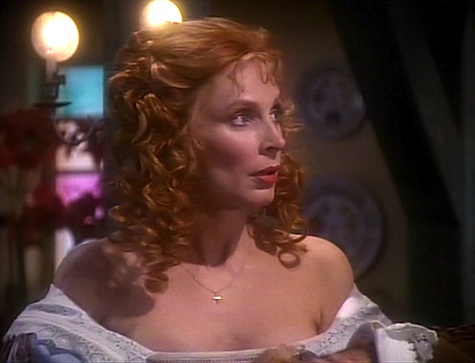
Make it So: “And when your tears fall for him, some few will be for me.” There have been times over this rewatch when I’ve gone into great length in this section about it (sometimes excessive, viz. “Sarek”), but I don’t find that I have much to say about this episode — but not for any bad reason. Quite the opposite, it’s an excellent episode that works on pretty much every level. It’s a good sequel to “Hollow Pursuits,” as it gives Barclay what he always wanted — confidence, creativity, intelligence — but yanks it away from him at the end. It provides a wonderfully alien species in the Cytherians, who are in the fine Star Trek tradition of aliens who seem menacing but turn out to be more complicated than that. It makes very good use of Cyrano de Bergerac, one of the greatest plays in the history of human theatre. (Digression: I got to see a production of it when I was a kid with Derek Jacobi in the title role on Broadway. “Amazing” doesn’t begin to cover it.)
Ultimately, what sells it is Dwight Schultz, who gives a superb performance: the contrast in his two Cyrano scenes, the increased confidence as he goes on (modulating from his typical Barclay babbling when he suggests modifications to Crusher to his godlike takeover of the computer), and particularly in the subtle changes to his facial expressions when he’s virtually immobile on the holodeck and talking through the ship’s speakers. Just a great performance.
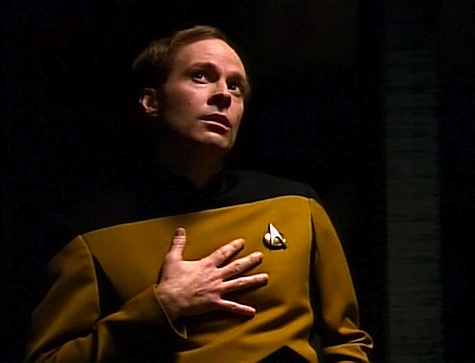
Warp factor rating: 8
Keith R.A. DeCandido reminds everyone that it’s the nominating period for the Parsec Awards. You should totally go to their web site and nominate the podcasts he’s involved with: The Chronic Rift, The Dome, HG World, and, of course, Dead Kitchen Radio: The Keith R.A. DeCandido Podcast.










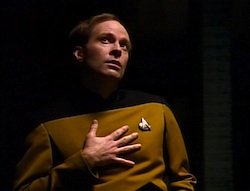
For some reason, I always overlook this episode when picking my “top 10” but I will always include it from now on.
I had completely forgotten about it!
I now remember how great it made me feel: all the possibilities it evokes – of super-intelligence, of yet-to-be-discovered ways of travelling, of aliens who have such a unique approach to first contact! It is wonderful Star Trek and Sci-Fi all at once!
One interesting thing about this episode is that it contains several allusions to Arthur C. Clarke. The Argus Array is from Imperial Earth, where it was a telescope built in the outer solar system to detect super-duper low frequency radio waves that are normally blocked by solar radiation. And of course LaForge making sure to disable the audio and visual pickups in the conference lounge is an allusion to 2001.
But one thing bugs me about this episode: Shouldn’t the Prime Directive go both ways. If it’s wrong for the Federation to give information to less advanced cultures, shouldn’t it be equally wrong for them to accept it from the Cytherians? The double-standard makes the PD seem like a way of the Federation making sure less advanced races don’t suddenly become competition for them.
Going to agree with you on this one- it was a joy to see one of TNG’s “B-Players” be the focus of an episode as it was a nice refreshing change. You can see how good of an actor Dwight Schultz is as he plays the normal, bumbling Barclay and the supremely confident, god-like Barclay well, making the transormation that much better- he makes both seem believable.
Otherwise just a good sci-fi episode.
@2,
As we have seen several times (most recently in “First Contact”) the PD doesn’t apply to warp-capable civilizations. They’re going to come into contact with all manner of technologies and races, the question is one of managing rather than preventing.
The Federation has never shied away from picking up advanced technologies from other civilizations. In ST:TMP it was stated (maybe just the novelization) that sickbay facilities had been improved using Fabrini technology. The Feds have no problem trying to extract knowledge from derelict spaceships, archeological sites, and so forth. And really, the PD is about “We don’t want to screw up another culture.” The Federation doesn’t seem to mind screwing themselves up.
Interesting point, Sean, in regards to a reverse Prime Directive. In one aspect, it sits in opposition of the concept behind Starfleet’s explorations, but realistically the Federation is in just as much danger of overly rapid advancement as any pre-warp civilization is. They must have SOME policy for encountering more advanced beings since it happens so often.
It also makes me curious if such policies would apply to technology or information brought back from the future for present day application/possible destabilization. (Looking at YOU, Janeway.)
Unrelatedly, wasn’t it implied in Greg Cox’s Q Continuum trilogy of books that the Big Giant Star Trek V Head was a rogue member of the Cytherian species, hence the imprisonment in that planet in the middle of the galaxy?
“And in the end, after Barclay has returned to normal, Troi takes him up on that walk, which Barclay nervously agrees to.”
–Heck with the Level Two Diagnostic! : )
This episode reminds me much more of Star Trek I (TMP) than Star Trek V. Barclay’s journey to a new, mechanically-enabled (though not menacingly Borg-like) level of consciousness seems somewhat similar to the journey taken by Ilea and Decker.
Meeting an alien species like the Cytherians, who desire an exchange of information, is very Star Trek in the Rodenberry ideal.
In short, like “Where No One Has Gone Before,” this is a genuine science fiction story, in which the characters take a positive journey to a new world. Maybe not a standout on the order of “The Best of Both Worlds,” but one of the best of the season, and deserving of more attention. This didn’t occur to me at the time, but as I reread these rewatches, I notice that this episode provides something of a needed course-correction from the lurch between familial dramas (“Family,” “Suddenly Human,” “Brothers”) and sexual harassment/forced romantic attachment–between alien women and men (“Devil’s Due” and “First Contact”), between a human man and a human woman (“Galaxy’s Child”) and between a fictional man and a human woman (“Qpid”)–that made up more of the fourth season than I remembered.
P.S. Krad: since you mention theatrical productions, you might appreciate this: I was fortunate enough to see Sir Patrick Stewart, Gattes McFadden, Jonathan Frakes, Brent Spiner, and Colm Meaney perform together in a production of Tom Stoppard’s play, “Every Good Boy Deserves Favor” at the Chicago Theater!
Keith, a neutron densitometer is a real device. It’s basically like an x-ray machine, but using neutron beams instead of x-rays. (Taking an x-ray is a form of densitometry, i.e. measuring how dense things are by shining radiation through them and seeing how much they absorb.) We’re still in the part of modern Trek where there was some attention paid to real science.
While this episode is pretty good in most respects (aside from the really silly-looking Cytherian effect/makeup), it’s always bothered me how xenophobic the crew gets about Barclay just because he got smarter. It’s falling too much into the mass-media sci-fi cliche that higher intelligence is something to fear, something that makes people colder and less human and more dangerous, and that just plays into the anti-intellectual prejudices found in much of American society. As someone who was ostracized and resented and bullied in grade school just because I was a nerdy sort who did well in class, I really didn’t like seeing my Star Trek heroes embracing that kind of kneejerk intolerance toward intellect.
Not to mention that it’s inconsistent. If Barclay was really so much smarter and more confident — and if his social intelligence increased enough that he was able to flirt well with Deanna and perform persuasively before an audience — why would he have somehow become less able to work as part of a team or show respect and reassurance to his crewmates? Even if he believed he knew better or got impatient with the others thinking so slowly, he’d still be smart and perceptive enough to understand how they were reacting and how to play along and assuage their fears.
Chris @@@@@ Tor: Nope, the Q trilogy established no such thing (and I double-checked with Greg to be sure).
Christopher: I disagree. Barclay was undergoing a MASSIVE personality and intelligence change literally overnight. That IS cause for concern, especially when that same guy just messed with the tactical systems during red alert without consulting anyone first.
@7, CLB
“why would he have somehow become less able to work as part of a team or show respect and reassurance to his crewmates? Even if he believed he knew better or got impatient with the others thinking so slowly, he’d still be smart and perceptive enough to understand how they were reacting and how to play along and assuage their fears.”
For some, perhaps, but there are real life “Sheldon Coopers” out there…
@2, @5: I think that it’s eventually more-or-less established that the next ‘level up’ where civilizations shouldn’t share information any more, after ‘warp-capable’, is ‘time-travel-capable’ (Well, time-travel without using ancient gates or risky slingshot effect warp tricks)
I’ve always enjoyed the this episode especially the interaction between Barclay and Worf, and when puts the moves on Troi. This also starts the precident of aliens mutating poor Barclay.
I think the crew actually does a pretty good job of keeping a cool head (barring trying to phaser Barclay out of his device) in regards to Barclay’s leaps in intelligence. They’re used to dealing with folks like Q who decidedly do not take individual lives into consideration when taking the crew along on a whim. (Which we’ll see this Friday in the rewatch, in fact.) Data has an iffy track record in this regard, as well, so to me their initial antagonistic reaction is justified. I don’t doubt this would have smoothed out if we’d seen this play out over a longer period of time.
Also… HEY EVERYBODY! Did you know that regular Star Trek Rewatch commenter Christopher L. Bennett has a new Star Trek book out today? It has time travel! And James T. Kirk! And while we generally frown on brazen self-promotion in comments, I am instituting some fancy executive privilege (whatever that is) to point you towards it:
Star Trek: DTI: Forgotten History is the name.
The prime directive is always a double standard. Its the Federation way to suppress information from inferiors to keep them inferior. Wouldn’t want them to get too uppity ya know.
Some uncommonly good performances in this one, huh? I love Reg Barclay episodes and this one is the best of them all (although we don’t get to see Wesley eating a pie).
But how about that Gates McFadden? I am always blown away by the short, enchanting scene where she reacts to Reg’s new and improved theatrical skills…the slight glimmer of tears and very convincing show of emotion. I get all verklempt just thinking about it! Speaks to both actors’ abilities — could have been much cheesier.
BTW, Christopher, the fact that it’s a real device does not change the fact that “neutron densitometer” sounds like something out of a 50s alien invasion movie. :)
—Keith R.A. DeCandido
Oh, and um, DEREK FREAKIN JACOBI on BROADWAY in CYRANO? “Jealousy” doesn’t begin to cover it!
I’m not expert on star trek, but it was my understanding that the prime directive isn’t about sharing technology, its about letting planets know that aliens exist only when its too late to stop them from finding out themselves when they develop warp capability (e.g. the first contact episode which was recently reviewed). This isn’t about suppressing the technology, but rather about making that large step into alien relations etc as smooth as possible as it is a massive culture/political shock to a planet if they aren’t ready for it.
@9: Yes, of course there are geniuses who are socially inept; that’s a large part of where the stereotype comes from. But the episode showed that Barclay’s brain boost made him better at flirting and better at acting. Those are aspects of social intelligence, knowing how to relate to other people, to empathize with them and shape your behavior to appeal to them. So it’s inconsistent that he would become more socially sensitive in those areas yet totally forget how to function as a member of a team.
@12: First, thanks for the plug. As for the crew’s response, yes, they know about superbeings like Q, but Barclay is one of their own, so I wish they’d given him the benefit of the doubt and been at least guardedly happy for him until things started to get out of hand.
@17 and others: The basic idea of the Prime Directive is not to impose your own will on other cultures, to respect their right to make their own choices and have their own identity. With post-contact civilizations, that means not meddling in their politics, not taking sides in their internal conflicts (as we’ll see when we get to “Redemption” in a few weeks), and not forcing them to change their laws or customs just because the Federation disapproves of them. The ban on any contact with pre-warp civilizations is based on the assumption that with such a great technological disparity, the contact couldn’t help but force them to change, so the best way to let them keep their own identity and autonomy is to leave them alone. (Although anthropologically speaking this is a load of rubbish; history shows that less advanced cultures can not only survive but thrive after contact with more advanced cultures, so long as the more advanced cultures don’t actively force them to change.)
I’ve always thought the point of the PD was to prevent less developed civilizations from becoming client states dependent upon the Federation for gizmos that are too far advanced to reverse engineer — basically, what I imagine the Ferengi do whenever they find a less developed culture. That’s a problem that could still affect the Federation when dealing with more advanced civs.
@19: Well, that sounds like one facet of the general principle of respecting and preserving others’ autonomy. It’s not the only thing the Prime Directive is for.
At its core, the PD is a reaction to Western imperialism, a rule designed to prevent the kind of things we see in history where the British Empire or the United States tried to suppress or eradicate indigenous cultures and re-educate them in “superior” English or American culture, allegedly for their own good. That was a classic example of how good intentions can do disastrous harm if you’re so arrogant to assume that your ways are automatically better than every alternative. Remember that ST came along in the Vietnam era, when America was beginning to recognize the damage caused by supposedly benevolent colonialism, and when multiple minority groups were openly confronting the domination of white culture and saying that it harmed them more than it helped them. So the PD is about recognizing that you can’t assume you understand what’s best for another culture better than its own people do, and that you don’t have the right to force them to do things your way.
@18 CLB
Inconsistency is very human. I would add that working in groups is quite different from shining alone. Barclay acts and flirts alone and in control…he is not in control as the member of a team.
Just like Geordi’s reaction to Brahm’s holodeck program discovery, it may have been inappropriate and inconsistent, but it was very human.
Overall I like this episode – my husband had shown it to me before we started watching the series from episode 1, so I vaguely remembered it. I like the Barclay character a lot, as I also tend to be socially inept.
I also thought it was a little hypocritical of them to be thinking about confining Barclay, although I understand that they really had no idea what was happening to him – if he was under some kind of alien influence or not (which it turned out, he was!). It wasn’t just that he was getting smarter or more confident, but that it was obviously not an intrinsic change. But – considering that they let DATA roam around the ship after all he’s shown himself capable of…heh.
I think he did get a little Sheldon Cooper-ish towards the end, actually – everybody was asking him to stop and he basically said he knew better than they did and hat they were like ‘children’. I’m not sure if that was what he actually thought, or if he was ‘programmed’ to think that though.
I actually found the Cytherians to have some unfortunate implications – the idea of this benevolent, knowledge seeking, all powerful species is great, but…is it really ethical to ‘program’ human brains? Also, what if the telescope array had been a manned station? They just triggered all the reactors to blow up with their probe which could have resulted in a massive loss of life! Even without it being manned, it represents a huge investment on the part of the Federation. You’d think such a super-smart species would be able to create a probe that would know if the technologies were compatible before blasting it with whatever they blast it with!
And is it just me, or should they get off of their lazy bums and go do some exploring themselves!
Anyway, Qpid is next, ugh. I love Q but I do not enjoy this episode. I’m not sure which one is worse to me – this one, or the one where Barclay devolves into a spider. We watched it last night just to get it over with, haha.
This episode for me just delineates the inconsistancy of the “human” reactions of Geordi and Barclay. Where Geordi interacts in a fully social manner with everyone who isn’t a romantic interest – Barclay is completely non-functional at the start of the series yet evolves into a hero of epic proportion by the end of Treklore. Barclay is allowed to have character development where Geordi is not. Very lazy writing as far as I am concerned.
Oh, and does this episode pre-date Batman Forever or not? Because I totally thought of the Riddler and his box when I saw Barclay sitting in the holdeck with the laser beams shooting into his head ;)
Batman Forever came out in 1995, a year after TNG went off the air. (If anyone cares, here’s my scathing review of it, which I posted on GEnie, which right there should give you an idea how long ago 1995 was….)
—Keith R.A. DeCandido
Only one thing to say about this episode – yeah!
I loved this episode and it made me a big time Barclay fan, which kind of set me up to be disappointed by his next outing.
I lived in denial forever (forever, get it?) that Batman Forever was better than what everybody kept saying about it. Unfortunately I finally had to face reality. It’s just not very good. Some stand outs are the Riddler’s riddles, which apparently just add up to the Riddler being Edward Nigma (why Bruce Wayne would care who the Riddler is is anyone’s guess), plus the Riddler’s plan doesn’t even garner a hiccup despite his learning the ginormous revelation that Bruce Wayne is Batman. Also, Two-Face is so tied to the coin, that he just keeps flipping it until it gives him the decision he wants.
Well, that shows how out of it I am when it comes to dates – I just remember being somewhat young when Batman Forever came out (early middle school age, I think). Not gonna lie, when I was little I loved that movie :) So I still have a soft spot for it, as long as it’s not taken too seriously. Not that I ultimately diagree with your critique, I just think I’m ‘bad’ at determining that a movie is bad sometimes.
Also, my husband had your review up on his computer this morning and my first thought was, “Woah, internet blast from the past!” I remember when all websites looked like that :D
I almost want to make this into a Batman Forever discussion now.
The thing that confused me this time around is why Data couldn’t just as easily have made the new control system just as fast. Are they suggesting that it is not a standard program and it will take innovation skills that Data does not possess? Because one would think that as a matter of speed, Data could still program faster, and he would probably have the knowledge of how to make the control system.
Oh dear…Qpid didn’t scare you away, did it?
I hope all is well!
@”Lisamarie” I assume he forgot. Give him a break.
Woah, chill. It was a joke – because I don’t like Qpid myself, so I was joking that it was so bad that he couldn’t watch it.
And, I DO hope all is well. He doesn’t seem to be the forgetful type, and at least I know on the other re-reads I follow, when the posts are delayed without advance notice it’s because something real-life issue has popped up which takes precedence.
I’ve been entertaining myself with the other movie reviews on his website though :)
Hey folks! Sorry, just some real life stuff involving a day talking to middle-school kids, obligations at the dojo where I’m a black belt and our instructor’s on vacation (so I’m one of those who helps teach while he’s away), and a house guest combined with the usual writing and editing deadlines to prevent me from getting the rewatch of “QPid” done. It will go up Tuesday.
Again, apologies.
—Keith R.A. DeCandido
Glad it’s a good kind of busy-ness and nothing bad :)
Also, middle school kids? How come we never got anything that cool in middle school?
Sean@2, normally I would assume it was coincidence, but in an episode as stuffed with Clarkeana as this one, I can only presume that Barclay saying “I’m afraid I can’t do that sir” is channelling HAL in very slightly different words.
@2 and 35,
This is more than just referencing Clarke, this story IS 2001, A Space Odyssey. Alien probe changes humans ands sends them through space to meet the creators, this IS Clarke. It’s got Flowers for Algernon as an added bonus. And who cares? This episode ROCKS! It is fun, which this show sorely lacked in season 7.
Does anybody know where the line ‘to quote Ronald D. Moore, “The absolute last thing that we wanted to remind anyone of was Star Trek V.”‘ came from? It was on Memory Alpha until being deleted this year for being unsourced.
The Barclay episodes are always a special treat, and this one is no different. This is one of my favorite episodes for all the reasons Keith mentions. As said, its a true sci-fi tale and so much damn fun. Dwight Schultz is once again excellent, this time becoming a “super”human who ultimately takes the Enterprise to an awesome looking area of the galaxy. Just damn good fun this one.
I think 8 is about right for this one. It is good and even great on many levels. My biggest gripe (and it is significant) is that the story is ultimately hollow — that is, everything would have happened exactly the same way (after the shuttle craft part) if the rest of the crew had just sat back and done nothing. Call me old-fashioned, but I like my protagonists to have some effect over the outcome. And since Barclay isn’t doing any harm and doesn’t seem to be in any physical danger, there is less suspense than it feels like there should have been. But everything else is so well done that it makes up for a lot of that.
Ultimately I think the reason this episode works is that it is Barclay in the lead role. He is a likable charcter, finally getting what he always wanted, so we can root for him and despair when he starts getting himself into trouble. This wouldn’t have worked nearly as well with a new, off-the-shelf character. It also wouldn’t have been as effective with a main character, as Barclay is theoretically disposable, so there is a real threat there.
My take on the prime directive discussion. Picard says “we bring back knowledge of their race that will take our scholars decades to examine”.
You can interpret it that they got loads of technical information. But I’d like to imagine they just got a lot of antropological data. And maybe they didn’t get direct theoretical explanations of what they saw over there. So what they saw wouldn’t put them in danger, from an overload of advancement, but will inspire their own research and development.
And about 2001. Barclay saying ‘I’m afraid I can’t do that, sir’ (29:02) sounded to me like HAL talking. It made me lmao!
I love this episode also, but something about the Cytherians I don’t quite get – if their objective is the benevolent exchange of knowledge, why was their probe programmed to chase the Enterprise and force them to destroy it or be destroyed by it? Maybe that bit was added for fake drama/suspense and an opportunity to showcase Barclay’s nascent genius, but it doesn’t really ring true with the characterization of the Cytherians, and frankly made no sense to me.
To the person who said that Barclay should be able to interact just fine w/ the crew because of his increased intelligence: ARE YOU KIDDING ME? Geniuses and people who know they are extremely intelligent are often the most difficult to deal with. I’m not talking about people who aren’t properly socialized, I’m talking about people who can interact just fine but just find everyone just below them. There’s a real threat that Barclay will decide he knows what’s best, and guess what? That’s what actually happens.
They could have used Data much more effectively in this episode. He of everyone knows what it’s like to be much more intelligent than everyone else. Why isn’t Data in the conference room when they’re discussing what to do w/ Barclay?
The one thing that always bothered me about this episode was that nobody seemed to think retro engineering the method that allowed them to travel through subspace. If they had, we may all have been spared Voyager all those years later.
This is one of my favorite episodes. It’s also one that I had strong memories of from years past. But the Barclay episodes always make me wonder how the heck he got picked for the Federation’s flagship. He is bumbling, overly shy, and has been shown to shirk responsibilities?!?!?!?
Again a superb performance by Dwight Schultz, who again goes from ‘insecure, stuttering introvert’ to ‘overly confident’ in just a matter of seconds.
I also love Riker in this episode. The confused looked after Troi just walks away smiling is just priceless.
The only real problem with this episode is, how on earth Barclay can control the ship from the holodeck. This is a huge security breach! The main computer shouldn’t be accessible from everywhere!
Sorry if this has been brought up before, but what’s the deal with the subspace field? It takes them across thousands of lightyears in a few seconds, and we never see its use again! Did no one take notes on how this was accomplished? Guys, you didn’t need a Traveler guru this time! The ship did it! Somehow.
Well, at least it wasn’t as silly as mushrooms…
The episode which sadly predicts the current state of space exploration. Instead of going and experiencing like the Enterprise crew, we now just fire off probes and hope for a few scraps of knowledge drip back, or that some race which did put the legwork in drops by to say hi.
I’ve heard the “rogue Cytherian” theory before, and it really works alright, but I liked the Cox version better (which as noted, does not mention Cytherians). Harder is trying to decide between Cox, PAD, and Diane Carey for more on the Galactic Barrier.
Big mood, as the kids say. Exploration by Instacart. Sorry, I know you were expecting a giant telescope array to come by, but we substituted this nice Enterprise full of humans at a small additional charge. Your delivery is on its way!
A great 45 minutes of TV viewing. It was a joy to see that Barclay returned as a recurring character and Dwight Schultz gave an amazing performance playing both traditional Barclay and superhuman Barclay. The direction by visual effects supervisor Rob Legato is excellent and cinematic, and it makes sense that he would be the director for this episode given all of its technical aspects. I liked the expansion of Beverly’s character giving her an actor’s workshop (something Gates McFadden does in real life) and just showing life among the crew off-duty in general. The interplay among Troi and Barclay was also nice and there were some top-notch moments of humor too. In particular, when Barclay let’s loose with a stream of technobabble and Riker responds with an unconvincing, “Uh huh, I see that” makes me crack up every time, and Troi being mum to Riker on the success of Barclay’s pass on her was also cute.
Question though: what is the point of a high-powered telescope like the Argus Array in a warp power era/civilization? Sure, we can use something like the Hubble Telescope now because we’re confined to the Earth but for people in the future who can warp to anywhere, what’s the point of a telescope observing the heavens from a fixed point?
@50/garreth:
There are all sorts of places they still can’t warp to, at least in any kind of time that would be practical for observation: other galaxies, far-off parts of this galaxy, etc. A high-powered telescope in the middle of interstellar space, away from nearby stars and their concentrated radiation emissions, could observe phenomena that are much too far away to visit, with more sensitivity than a planetary or orbital telescope.
Also consider that in the age of FTL travel, a really powerful telescope could be useful for historians: put it a thousand light-years away from Bajor, for example, and you can get at least some sense of what they were up to as a spacefaring civilization while humans were still perfecting the sailing ship. Want to know what the Husnock empire looked like in its prime? Take a telescope a few hundred light-years away and point it at their homeworld.
The Argus Array probably also has subspace-FTL sensor arrays on it, as well as every other sort of sensor.
The fucking captcha is impossible, by the way. Whatever the algorithm it is using to mark the correct number of squares with crosswalks, cars, or traffic lights, is seriously fucked. Can you not replace it with a better system? No, I can’t make an account. I don’t want to have another password to reset when you inevitably get hacked and dribble account info over the dark web. Just get a captcha system that knows what it is asking for. Fucking pain in the fucking arse. I feel like Picard, screaming at it that there are four fucking lights.
@50: In one of the alternate universes in the episode Parallels, the Cardassians were using the Argus Array to spy on a number of Federation locations (including the Utopia Planitia shipyards all the way back at Mars.) Thus whatever a “subspace telescope” is, it must have the capability to provide contemporary images across vast interstellar distances.
Since I’m sure Dwight Schultz and the production staff had HAL 9000 in mind here, I wonder what Stanley Kubrick would have done with this idea? Knowing his sensibilities, he’d probably be interested to see Barclay become more dehumanised over the course of the story until he became a threat to all mankind. Kubrick would have had a field day with this.
I wanted to read your scathing review of the Batman movie. Didn’t someone at least wayback the site at some point?
Not much to say about this epsisode save that I enjoyed it. This is my second time watching my way through the show and reading these reviews, but i think it’s my first time stopping to comment on any of them.
I really enjoy coming here are reading the trivia and the comments. The reviews are a highlight, mainly because it helps me interrogate my own opinions. It adds a fun bit of reflection to the whole experience. Maybe ten years from now, once i can barely remember any of these episodes again I’ll do it a third time!
Yeebo: While the review of Batman Forever that I posted to GEnie was archived on my SFF.net web site back in 2012, that site has gone the way of the dodo.
Lucky for you, though, in 2017 I launched a feature on this very web site where I looked at every live-action movie based on a superhero comic book. Here’s what I had to say about Batman Forever (which I looked at alongside Batman & Robin).
Enjoy!
—Keith R.A. DeCandido
Top 10 TNG episode for me for sure. The ending was especially cool considering that it seemed to be pointing to a nefarious conclusion and then pulls a 180 and ends in a classic Trek manner. And once again, Dwight Schultz shows off his considerable talents. I imagine it’s quite difficult for a good actor to portray a bad actor, but Schultz pulls it off in his first scene as Cyrano de Bergerac. Later on, when his newfound confidence and inspiration takes hold, I have to agree with Troi, his Cyrano rehearsal is absolutely brilliant.
@58/Thierafhal: Yeah, if the Emmy’s were a legit acting awards organization than Schultz should have been nominated for Best Male Guest Actor in a Drama for both “Hollow Pursuits” and this episode. Just a great actor who helped breathe life into a memorable endearing character.
The only real problem that I have with this episode (and “The Corbomite Maneuver,” and “By Any Other Name,” and probably a few other episodes that I’m not thinking of that end with a peaceful exchange of knowledge with an extremely advanced alien civilization) is that it seems like it should bring about immediate changes in the technological status quo for the Federation. I mean, I know that Picard mentions that it will take scholars decades to go through everything they learned from the Cytherians, and that Barclay was reverted to normal in the final act, but surely his design for a neural-scan interface must still be recorded in the holodeck; surely someone wrote down what he did to soup up the Enterprise‘s shields by 300%; and why wasn’t his Quick n’ Easy trick for safely jumping 30,000 lightyears at a time using parts you probably have at home ever utilised by Voyager? It’s the problem with having a good, standalone story that needs to exist within continuity.
I liked this episode; I especially love “costumers” (e.g., Dr. Crusher’s dress). I definitely liked this episode better than the later episode where they again picked on poor Reg and blew up his head. One thing I don’t care for in this episode is that they once again painted Troi’s face white, and forgot that she has a neck and chest.
It is indeed a cute episode, even though it’s not my favourite. But what i’ve just realised – again – is how Dwight Schultz is a really good actor and how he was “underutilized” in the series and the same is true for his character. I like Barclay very much. :)
@62/th1_: While I agree with you that Dwight Schultz is a very good actor, I think Barclay was used in just the right amount on TNG. His average of one appearance a season since his debut in the third season (with two appearances in the sixth to make up for his absence in the fifth) were always welcome “events.” We got to know and understand him quite well I believe. If anything, I feel like VOY overused the character simply for the sake of stunt-casting and ratings.
I kept waiting for Barclay to respond with “I am putting myself to the fullest possible use, which is all I think that any conscious entity can ever hope to do.”
@63/garreth: agree totally about VOY. i could have been used to having Barclay at least be small part of discussions in engineering etc more often on TNG, not necessarily to have more episodes focused on him.